The battle was lost much before it ended. For, there couldnt have been an army more divided than the upseb strikers. Nor more confused. Some said they were battling for "post-reform service conditions", some saw the 11-day strike as a war against privatisation, others said it was a strike to preserve swadeshi against international conglomerate mafias. And yet others claimed to be strugglers for causes more bizarre...
"This sarkari bid to trifurcate will get three mukhiyas (chiefs) in an electricity board where our constitution had provided for only one," declared an orator before protesters in Lucknows Hydel Field Hostel, the site of the agitation, "One mukhiya wouldve been equal to all, three wont be. If the reforms go through, different people will get different amounts of electricity. Its inequality!"
Blundering through thus, the protesters appealed for public support for their cause. "The small bribes we take to fudge your bills will seem a pittance compared to what youll have to cough up," argued meter tester Kanshi Prasad. This logic-gone-awry finds echo among other agitators. Says meter reader Arvind Srivastav: "The public that calls us chor is dacait itself. They bribe us. Everybody in India is corrupt, the most corrupt are our ministers." A bunch of upseb housewives add to the grouses against that source-of-all-evils, The Indian Politician. Reasons Veena Mittal, a upseb senior assistant engineers wife: "Transfers to good departments and livable cities have to be bought off ministers."
Its stunning just how matter-of-fact the confessions to rampant corruption are. What shocks more is that most employees in the board see themselves as cornered into malpractice. Yet dont think any restructuring might make a difference.
Any ideas then how not to reform but change? Says cellphone-toting Babbo Avasthi of the Vidyut Karamchari Morcha Sangathan: "The vigilance police adds to the frauds. Let us do their jobs. Like more responsible brothers are asked to keep a check on those less responsible in a family."
Difficult, this, considering that the family Avasthi talks of seems so fragmented. Theres strife even among the 12 unions in the strike. The engineers unions are impatient with those of the workers for not fighting for a cause larger than service conditions. The workers unions badmouth the elite concerns of the engineers.
"Rubbish. We stand united," says Shailendra Dubey, leader of engineers union Abhayanta Sangh. "Those who talk of divisions indulge in unofficial carping." He sees the strikes outcome as a success for the unions because it has put corporatisation to test. Because corporates wont pay for farmers subsidies, arrears of other governmental departments or electrification of 60,000 powerless villages. "Weve ensured that UP wont be the end of the debate against senseless privatisation."
But many even in the engineers union dont share this perception of victory. Senior assistant engineer Varalika Dubey, who has researched the problems that plague upseb, is distressed: "Professionals like me are unhappy with the deal. We rushed into it under tremendous public pressure because we were looking like harassers striking work." Also, says she, there are rumours of workers union leaders having been bought off: "Its clear that the issue of privatisation will recur in a year. We better start preparing for another strike."























